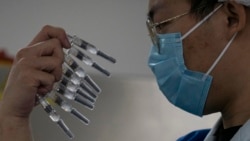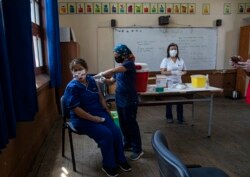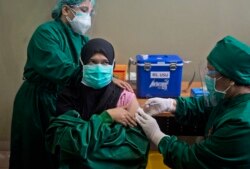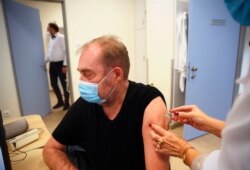In late January, a plane filled with coronavirus vaccines landed in Santiago, Chile. It was greeted by Chile’s President, Sebastian Pinera, who said “today is a day of joy.”
The vaccine came from China which has started a successful campaign of vaccine diplomacy. The Associated Press reported that China has promised nearly half a billion doses of vaccines to more than 45 countries.
Four of China’s many vaccine makers claim they are able to produce at least 2.6 billion doses this year for countries that want them.
There is little pubic information about China’s vaccines. Their efficacy and safety are unclear. It is also unclear what exactly China wants in return for the vaccine. However, more than 25 countries have begun using them and another 11 countries plan to start soon.
This acceptance is important for China because it wants to change its image. Many believe China mishandled the original outbreak of COVID-19, which began there.
“We’re seeing certainly real-time vaccine diplomacy start to play out, with China in the lead,” said Krishna Udayakumar. He is at the Duke Global Health Innovation Center at Duke University in North Carolina.
China has said it is giving “vaccine aid” to 53 countries and exports to 27. But it refused a request by the AP for the list of countries. China also rejects the idea that it is exporting vaccines to change its image or conducting vaccine diplomacy.
“I don’t see any linkage there,” said Wang Huiyao. He is president of the Centre for China and Globalization, a Beijing research center. “China should do more to help other countries, because it’s doing well,” he added.
Targeting poor countries
China has targeted poorer countries as rich, Western nations bought up most of the costly vaccines produced by Pfizer and Moderna. It has also targeted countries that have not received an early supply of the Western vaccines.
Chile is just one example. It received just 150,000 doses of the Pfizer vaccine out of the ten million it had ordered.
So, China sent four million doses of its Sinovac vaccine in January to the country of 19 million people. Chile now has the fifth highest vaccination rate in the world, reports Britain’s Oxford University.
In Indonesia, healthcare workers and President Joko Widodo all received the Sinovac vaccine. For countries in tropical areas like Indonesia, China’s vaccines are easier to use since they do not require extreme cold storage like the Moderna or Pfizer vaccines.
Most of the Chinese vaccines are from Sinovac and Sinopharm. They use inactivated virus, a traditional vaccine technology. Some countries believe they are safer, even though new-technology vaccines from Western nations are safe and even more effective against COVID-19.
Tyemur Musayev is an official in the Azerbaijan Ministry of Health. He said his country ordered 4 million Sinovac doses because it was made using “traditional and safe” methods.
In eastern Europe, China is providing vaccines to Serbia and Hungary where China is competing with Russia and Western nations for political and economic influence.
Serbia became the first European country to use a Chinese vaccine in January. The country purchased 1.5 million doses of Sinopharm vaccine and smaller amounts of Russia’s Sputnik V and Pfizer vaccines.
Many Serbians say they are not worried about Chinese vaccines.
“They have been vaccinating their own people for (a) long period, I assume they have more experience,” said Natasa Stermenski of Belgrade. She recently got a Chinese vaccine.
Hungarian Prime Minister Viktor Orban got the Sinopharm vaccine on Sunday. He recently said he trusted the Chinese vaccine the most.
Concerns about Chinese vaccines
China’s vaccine diplomacy will only be as good as the vaccines it is offering. And it still faces some problems.
Ahmed Hamdan Zayed is a healthcare worker in Egypt. He did not really want to get a Chinese vaccine because of the lack of public information about it. But now, after doing some research, he will be among the first in his country to get Sinopharm vaccine.
Sinopharm said limited information from its trials showed its vaccine to be 79 percent effective against COVID-19. Its chairman added the vaccine has not produced a single bad reaction. But the company did not answer requests for interview from the AP. Over 9 million Sinopharm vaccines have been given outside China.
Other Chinese vaccine makers, including Sinovac and CanSino, have not released any information about the results of their final trials.
There are also worries about how Chinese companies operate their businesses. In 2018, one of China’s biggest vaccine companies falsified information to sell its rabies vaccines. And a company related to Sinopharm admitted it made low-quality diphtheria vaccines.
“For a lot of people, the first thing you think about is ‘Made in China,’ and that doesn’t give you much assurance,” said Joy Zhang. She is a professor at the University of Kent in Britain.
But health risks and the restriction of the pandemic have largely overcome worries about China’s vaccines.
One Eqyptian official said, “We had to guarantee a vaccine. Any vaccine.”
I’m Susan Shand. And I'm Jonathan Evans.
The Associated Press reported this story. Susan Shand adapted it for Learning English. Hai Do was the editor.
________________________________________________________________
Words in This Story
joy - n. a feeling of great happiness
dose - n. the amount of a medicine, drug, or vitamin that is taken at one time
mishandle - v. to deal with or manage (something) badly or incorrectly
outbreak - n. sudden start or increase of fighting or disease
linkage - n. a connection or relationship between two or more things
tropical - adj. a warm climate
assume - v. to think that something is true or probably true without knowing that it is true
interview - n.: a meeting at which people talk to each other in order to ask questions and get information:
falsify - v. to change (something) in order to make people believe something that is not true
We want to hear from you. Write to us in the Comments Section, and visit our Facebook page.








